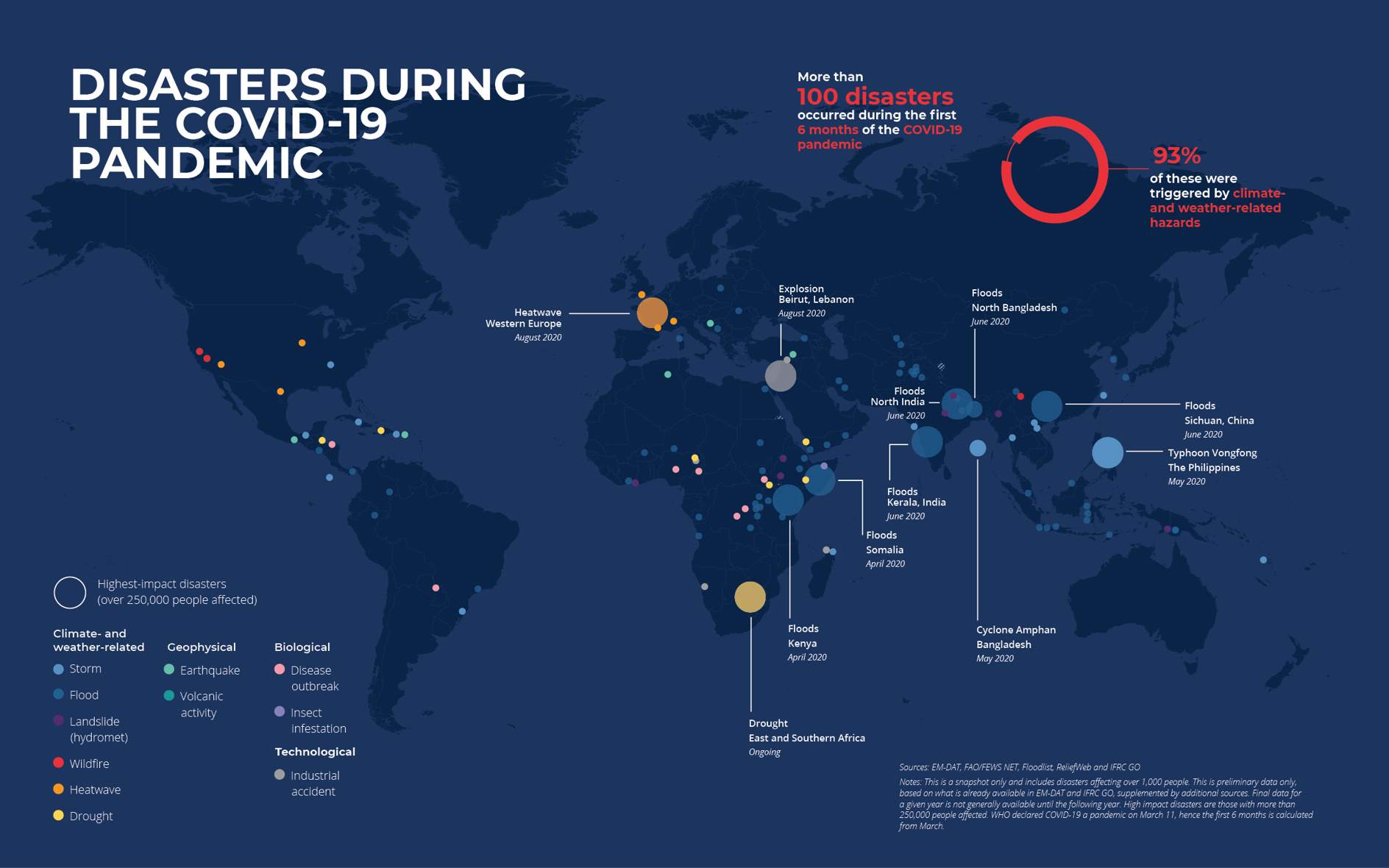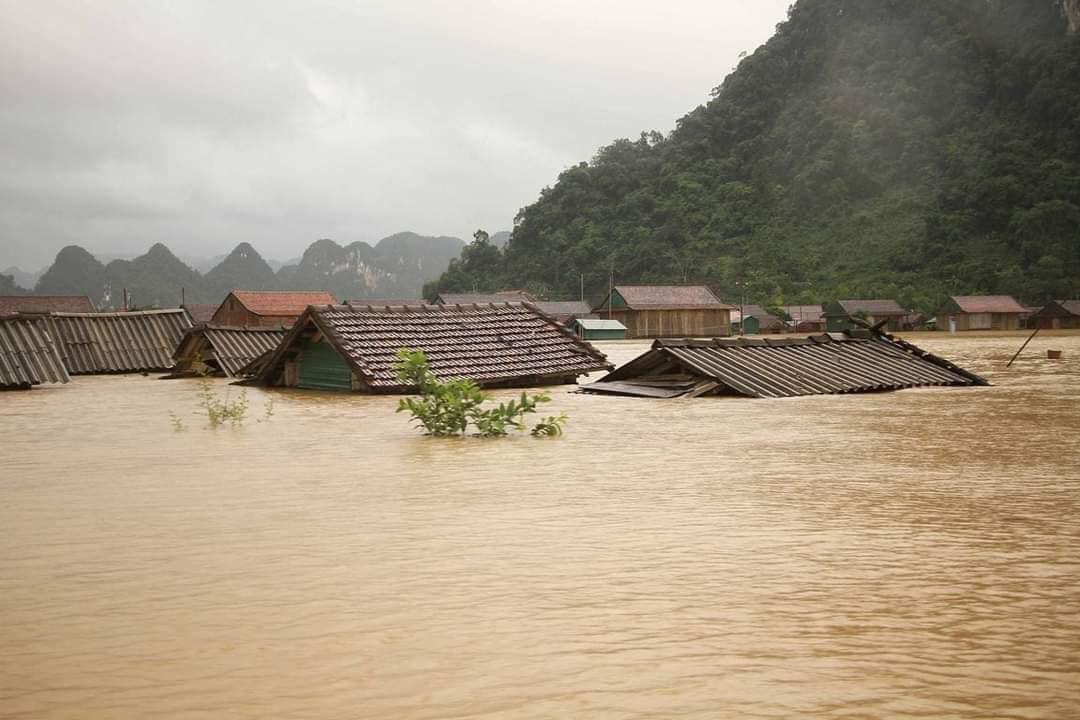Climate change and COVID-19 must be tackled together
Over the past decade, climate- and weather-related disasters have affected more than 1.7 billion people worldwide, killing hundreds of thousands. The COVID-19 pandemic has revealed how vulnerable the world is to a global emergency, but a bigger catastrophe has been building for decades – and humanity is still lagging far behind in efforts to address it. Adaptation, preparedness, anticipatory and early action must be immediately scaled up, breaking the silos and improving collaboration: between development and humanitarian stakeholders, among climate change experts, local populations, and across all other relevant sectors and actors.
Without immediate and determined action, the future will only be worse: according to the World Disasters Report 2020 released by the International Federation of Red Cross and Red Crescent Societies (IFRC) this week, an estimated 147 million people may be at risk of flooding worldwide by 2030. In addition, nearly 190 million people now occupy land below projected high tide lines, the intensity of tropical cyclones will continuously increase, and by the end of the 21st century 48% of the global population may be exposed to extreme heat for at least 20 days every year.
On 17 November, Germany’s Presidency of the Council of the European Union organised an online webinar on the World Disasters Report 2020 with the German Red Cross, the Anticipation Hub, the IFRC and the Red Cross EU Office. The event brought together more than 100 participants: from representatives of EU Member States and EU institutions such as the European Commission, the Parliament and the Council Working Parties on Humanitarian Aid and Food Aid (COHAFA) and on Development Cooperation (CODEV), to international and civil society organisations including the International Red Cross and Red Crescent Movement. Discussions highlighted the need to enhance multilateral cooperation and governance aspects, laws, policies and regulatory frameworks to support the most at-risk communities and people, make better use of scientific information and data, and increase attention to early warning systems, anticipatory action and forecast-based-financing to save lives and optimise available funds.

Dr Thomas Henzschel, Deputy Head of Division of Humanitarian Assistance at the German Federal Foreign Office, emphasised the need for collective action to make the aid system truly anticipatory. “Dealing with climate change cannot be limited to humanitarian actors only, joint action is needed through all global agendas, including the Paris Agreement, the Sendai Framework, the New Urban Agenda and the Sustainable Development Agenda,” he stressed, indicating that “it is encouraging to see that Forecast-based Financing and impact-based forecasting are discussed so prominently.”
Kirsten Hagon, Senior Analyst of Humanitarian Policy at IFRC, underlined that climate change is having wide-ranging impacts everywhere, every day. “COVID-19 is on everybody’s mind, but disasters have not stopped,” she stated. She shared the main findings of the World Disasters Report 2020 and its recommendations, with a strong call for action: “Everyone – humanitarian, governments, civil society, donors and climate experts – needs to get climate smart. Collaboration and coherence across humanitarian, climate and develop actors is needed.” On that note, she added that “legal and policy frameworks must be further integrated” for more efficient global coordination, and that communities need to be “empowered and supported to take the lead and drive change.” The World Disasters Report 2020 also shows that international climate and disaster risk reduction finance are not keeping pace with adaptation needs in low-income countries, and that those with the very highest risk and little adaptive capacities are not being prioritised.
The Head of Thematic Cooperation at the German Red Cross, Dr Thorsten Klose-Zuber, put forward that anticipatory action pays off, as “it aims at releasing funding before disasters occur to reduce their impacts.” He cited a recent example of Forecast-based Financing in Bangladesh, where cash assistance was provided to the most vulnerable communities ahead of a major flooding, allowing them to evacuate, protect their belongings or purchase sufficient food and needed items. Looking ahead, he suggested that “what is missing now is to learn lessons from action and share knowledge to scale-up on anticipation. This is the objective of the Anticipation Hub, which will be launched soon and is open to participation to all those who are working on this approach.”

Representatives from the European Commission shared their policy perspectives:
“First priority must be on the most exposed and vulnerable communities. This is at the core of our work”, stated Nacira Boulehouat, Head of Unit of Prevention and Disaster Risk Management at the Directorate-General for European Civil Protection and Humanitarian Aid Operations (DG ECHO). “The World Disasters Report 2020 is providing very useful evidence on how to save lives and money. It is confirming to us that we are on the right track, with a multi-hazard approach and investing in preparedness, early and anticipatory action”, she added. DG ECHO will focus on addressing conflict, climate, environment and biological risks, and they are investing “in reducing the environmental impacts of humanitarian aid.” “We cannot change everything overnight, but will invest into this and want to be leading by example,” she affirmed. The EU with its Members States is the largest humanitarian aid donor, and DG ECHO considers that better preparedness for climate risks is crucial.
Stefano Signore, Head of Unit of Sustainable Energy and Climate Change at the Directorate-General for International Cooperation and Development (DG DEVCO) concurred that “climate change is not a distant threat” but a real phenomenon that is “causing crises and jeopardising development gains.” COVID-19 has been a “wake up call,” he stated, reiterating that the pandemic has also put on the table the need to work together on recovery to “build back better.” He pointed out that the European Green Deal needs a strong external dimension to reach its objectives, underscoring that “this will be integrated in future programming, to support partner countries in building development and resilience.” “DG DEVCO is strengthening climate adaptation capacities, strives for a balanced approach and supports at-risk countries with disaster risk reduction,” he explained. Overall, the department’s funding portfolio for climate change action stood at EUR 10 billion from 2014 to 2019 (20% of its total budget).
Every government, organisation and individual has a role to play in tackling climate change and disasters. It is critical for the EU to honour their commitments on the European Green Deal, the European Consensus on Humanitarian Aid and the European Consensus on Development, guaranteeing adequate involvement and support to local civil society, but other key stakeholders must also swiftly step up their engagement to tackle this major challenge that is even more significant than the COVID-19 pandemic. There is no vaccine against climate change, but joint action can minimise the risks and improve crisis management while boosting global resilience.
ADDITIONAL INFORMATION:
The World Disasters Report is an independent publication commissioned by IFRC. Every two years, experts present a body of research that examines challenges, trends and innovations around a specific theme.
- World Disasters Report 2020 in this link
- World Disasters Report 2018 in this link
- World Disasters Report 2016 in this link
Other articles on disasters and climate change:
For media inquiries, please contact Eva Oyón on: eva.oyon@redcross.eu or +32 2 235 09 22

